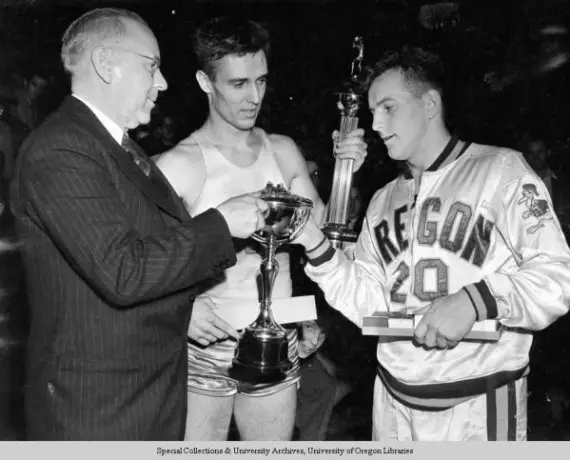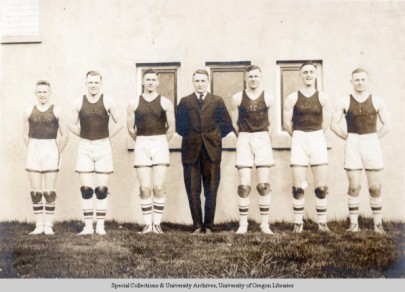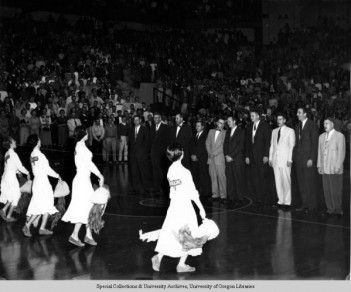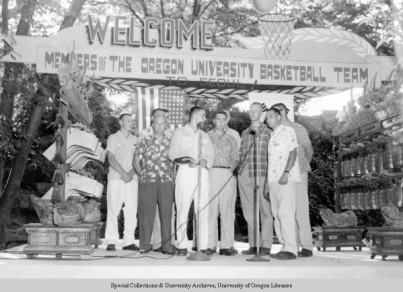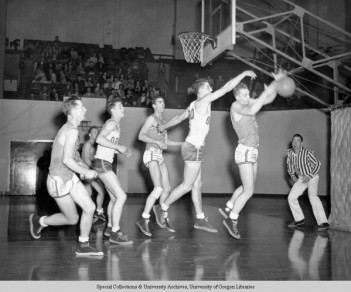There is a rich history behind the basketball program at the University of Oregon, one that is often overlooked in the wake of the recent successes of the football program. Throughout the 100-plus years that basketball has been played at Oregon, some great players and coaches have passed through the program.
1902 brought the first season of basketball to University of Oregon. It was coached by Charles Burden and lasted a whole two games, both of which the Ducks lost. The Ducks then proceeded to lose every game for the next two seasons as well, before finally recording a win — and a winning season — under Hugo Bezdek, who was also the head football, in 1907.
Bezdek left Oregon to coach football at Arkansas at the end of the season before returning in 1913, to coach football and basketball again at U of O. In his absence, the Ducks were coached by William Hayward, who was also the track and field head coach. During Hayward’s tenure as the head basketball coach, the Ducks went 31-21.
After Bezdeck, the Ducks were coached by Dian Walker, Shy Huntington and George Bohler, who combined for a 58-52 record. In 1923, the Ducks hired William Reinhart, who coached the Ducks from 1923-1935.
During his 12 years at Oregon, Coach Reinhart’s teams suffered only one losing season and won or tied for the Pacific Coast Conference title three times. This stretch of winning seasons was the best streak that Oregon fans had seen since the inception of the program.
When Reinhart departed the program in 1935, the Ducks hired former Oregon player and alumnus Howard Hobson. During his time at Oregon, Hobson’s ideas and plays were thought to be cutting edge and not seen anywhere else. He ran what was considered a fast break offense and a unheard of hybrid defense. Hobson was also one of the first proponents for the use of shot clocks and three-point conversions, lobbying for them before they were first introduced.
In his fourth season at Oregon, he led the team to the first ever NCAA Basketball Tournament, where they beat the Ohio State Buckeyes, 46-33, for the first ever NCAA Basketball crown, going 29-5 overall. L.H Gregory, sports editor, gave the team the nickname the “Tall Firs” because the Oregon players were taller than a lot of their competition. Hobson served as the head coach at Oregon till 1947, when he left to coach at Yale.
After winning the inaugural NCAA championship, the program went through a multitude of coaches, and up and down seasons. The Ducks didn’t make another appearance in the tournament until 1945, where they lost to Arkansas in the quarterfinals, 79-76.
It was another 15 years before the Ducks went dancing again. Head Coach Steve Belko, hired in 1956, took the Ducks to the NCAA Tournament in 1960, when they lost to California in the regional round, and then again in 1961, when they lost to USC in the West region quarterfinals.
One of the stars of the 1970 and 1971 teams was Stan Love, who was the Pac-8 scoring leader for two straight seasons. He is also the father of NBA star Kevin Love.
1971 brought in Coach Dick Harter, whose coaching style earned the players under him the nickname “Kamikaze Kids“. They were known for their hard play, intense defense and their insistence on diving for any loose balls. Though Harter and the Kamakaze Kids never made it to the NCAA Championships, they had their accomplishments, which included two 20-win seasons and three straight appearances in the NIT. The “Kids” were also credited with originally creating and inspiring the intimidating atmosphere at McArthur Court.
Coach Harter, who didn’t have another losing season at Oregon after his first, left the program in 1978, and the Ducks subsequently suffered through five straight losing seasons. In fact, it was another 34 years before the Ducks saw the NCAA Championships again when Coach Jerry Green led the Ducks to the 1995 dance.
In 1997, Oregon hired Ernie Kent, an original “Kamikaze Kid” under Harter. Under Kent, Oregon reverted to a style similar to that used during the Harter era. The teams featured an up-tempo style of play and a swarming defense, and Oregon started to win its way back to the tournament. In his third season at Oregon (2000) Kent led the Ducks to the tournament, where they lost in the first round to Seton Hall, 72-71.
Two years later, the Ducks won their first conference championship since 1945. They were seeded No. 2 heading into the conference tourney and eventually made it all the way to the Elite Eight before falling to Kansas. They finished the season ranked No. 11 in the AP poll. The next season, the Ducks won the Pac-10 tournament, and Oregon star Luke Ridnour was named the Pac-10 Player of the Year in 2003. The Ducks entered the NCAA tournament as a No. 8 seed and suffered a painful loss to Utah in the first round, 60-58.
The next few years were quiet for the Ducks until winning the Pac-10 Tournament in 2007. Heading into the NCAA tournament, the Ducks were a No. 3 seed. They made it to the Elite Eight before losing to Florida, the eventual champions, 85-77.
That year, the Ducks were considered locks to land high school stars Kevin Love and Kyle Singler, both of whom were considered the best high school players to ever come out of Oregon. Due to problems within the team, both Love and Singler choose to play elsewhere, going with UCLA and Duke, respectively.
In 2008, Oregon headed to NCAA tournament as a No. 9 seed, losing to Mississippi State in the first round. Two years later, the Ducks fired Kent, who left the Ducks as the school’s longest tenured and highest winning coach with 235 wins.
April 2010 brought in Dana Altman from Creighton University. In his first season with the Ducks, Altman lead the team to a CBI championship. Two years later, the Ducks made it all the way to the Sweet 16 before losing to Louisville, the eventual champion. The following year (2014) the Ducks made it back to the NCAA tournament where they lost to Wisconsin the Third Round .
In Dana Altman’s four seasons at Oregon, the Ducks have had two NCAA tournament appearances and one CBI championship. As Oregon’s recent success inspires better and better players to commit to the Ducks and Coach Altman continues his success in landing players from all over the country, the future looks bright for Oregon Men’s Basketball.
Top Photo courtesy of Special Collections and University Archives, University of Oregon Libraries
Pat Pannu (Editor and Writer) is a recent graduate of the University of Oregon. Pat’s been a crazy Duck fan since she moved to Oregon in early 2004 and has been 95% of all home games since the 2005 football season. She loves to talk about sports though those talks somehow always end in arguments. Pat loves to hear other’s view of the sports and teams that she loves and can’t wait to hear from you all. Follow her on twitter @patpannu

